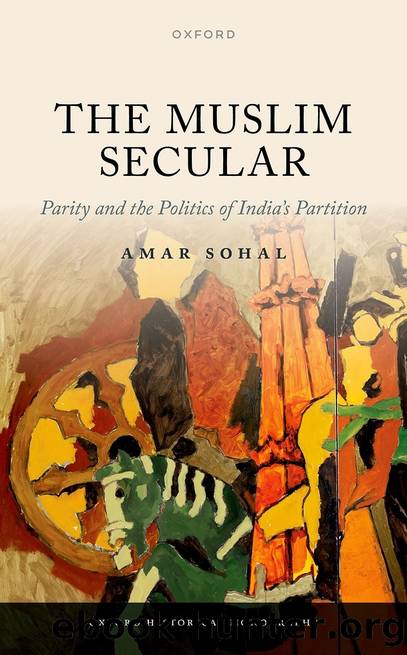The Muslim Secular by Amar Sohal;

Author:Amar Sohal; [Sohal, Amar]
Language: eng
Format: epub
ISBN: 9780198887652
Publisher: Oxford University Press USA
Published: 2023-07-29T00:00:00+00:00
An Organic Country
We have already seen that Abdullah had appropriated the popular view that the Mughals were the first in a series of unwelcome alien rulers who had deprived Kashmiris of their sovereignty and used them for their own interests. This, of course, separated him from his Congress allies. For Abdullah, the Mughals could not possibly be the naturalized foreigners of Congress history who forged a national culture with the communities they governed over. Despite the variety of historical emphases found among different Congress intellectuals, they broadly agreed that the Mughal period was a broadly positive episode in Indian history. In the case of figures like Nehru and Azad, this narrative belonged to political thinkers who chose, at best, to background the local as they sought to script a history for an Indian nation. If Nehru barely mentioned Kashmir in his writings on the Mughals, it is worth noting here that the role of Iqbal as a Kashmiri thinker did not extend to this debate either. While Kashmir may have appeared as the homeland whose story he claimed to know well, Iqbalâs connection with the Indian past was multifaceted and not reliant on a single identity alone. His views on the Mughals, which in different contexts varied from criticism to celebration, seemed to have been shaped by his concern for human freedom in an ethical polity or ideas of the Indian whole. His Kashmiri identity does not feature in the same way, even if he showed an awareness of the traditional conflict between Kashmiris and their Mughal rulers. In fact, his renowned poem to regional defiance against Mughal authority was inspired by Pashtun and not Kashmiri history. Celebrating the valiant effort of Khushal Khan Khattak to safeguard Pashtun dignity, Iqbal recalls how this seventeenth-century warrior-poet united multiple âtribesâ (qabail) in the hope of liberating them from the tyrannous rule of Emperor Aurangzeb.49 For Abdullah, however, things were quite different. A Kashmiri born and living in the Valley, his relationship with the grand narrative of Indian history was inevitably routed through the local.
In Part I of this book, we found that Akbar was the enlightened emperor of Congress nationalism. His safeguarding of religious pluralism and proclivity for cultural synthesis provides the great forerunner for its contemporary project. But while Akbarâs expansion of the Mughal Empire was an act of nation-making in this narrative, Kashmiri nationalism had memorialized Akbar in a different way. In 1970 at Mujahid Manzil, Abdullah told his supporters to âremember that our freedom movement did not start from 1931 [sic], but it began with the conquest of Kashmir by the Mughal armiesâ in 1589. He added that:
The last independent reigning king of Kashmir surrendered to Emperor Akbar after resisting and defeating his forces several times. Even today one sees the vast graveyards, still called the Mughal Maidan, of Mughal soldiers in Kishtawar, where the Mughal armies had to face the last pitched battle of Kashmiris for their freedom and survival. Since that unfortunate day, Kashmiris have suffered innumerable
Download
This site does not store any files on its server. We only index and link to content provided by other sites. Please contact the content providers to delete copyright contents if any and email us, we'll remove relevant links or contents immediately.
The European History Highway: A Guide to Internet Resources by Dennis A. Trinkle Scott A. Merriman(492)
The Seven Wonders of the Ancient World by Michael Denis Higgins(476)
European Security in a Global Context by Thierry Tardy(468)
European Security without the Soviet Union by Stuart Croft Phil Williams(468)
The Routledge companion to Christian ethics by D. Stephen Long Rebekah L. Miles(457)
Hudud Al-'Alam 'The Regions of the World' - a Persian Geography 372 A.H. (982 AD) by V. V. Minorsky & C. E. Bosworth(398)
Gorbachev And His Generals by William C. Green(390)
Get Real with Storytime by Julie Dietzel-Glair & Marianne Crandall Follis(388)
Tibetan Studies in Comparative Perspective by Chih-yu Shih Yu-Wen Chen(385)
Governance, Growth and Global Leadership by Espen Moe(380)
Hyperculture by Byung-Chul Han(375)
CliffsNotes on Fitzgerald's The Great Gatsby by Kate Maurer(359)
The Oxford History of the World by Fernández-Armesto Felipe;(353)
How Languages Are Learned 5th Edition by Patsy M Lightbown;Nina Spada; & Nina Spada(352)
The Egyptian Economy, 1952-2000 by Khalid Ikram(349)
Oral Poetry and Narratives from Central Arabia: The Poetry of Ad-Dindan : A Bedouin Bard in Southern Najd (Studies in Arabic Literature, Vol 17) (English and Arabic Edition) by P. M. Kupershoek P. Marcel Kurpershoek(341)
The Oxford Handbook of the Incas by Sonia Alconini(333)
Europe Contested by Harold James(319)
The Hutchinson Dictionary of Ancient and Medieval Warfare by Peter Connolly John Gillingham John Lazenby(304)
